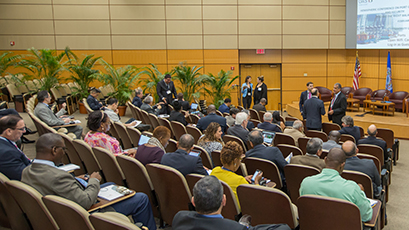CIBER organized the workshop along with the Inter-American Committee on Ports (CIP) of the Organization of American States (OAS) with the support from sponsors HudsonAnalytix and T&T Salvage. It came one day after a conference on supply chain operations, also organized by CIBER in conjunction with the School’s Operations and Supply Chain Management group. The Miami Conference on Operations drew speakers that included fellows of the INFORMS (the Institute for Operations Research and Management Sciences), MSOM (Manufacturing and Service Operations Management), and POMS (Production and Operations Management Society) organizations. School of Business participants included Hari Natarajan, an associate professor of management, who moderated a session on the impact of port security on supply chains.
“We have the top dogs of the port management business here to learn about successful practices in security and logistics,” said Jorge Duran, chief of the Secretariat of the CIP. “Countries throughout the Americas are investing in expanding their commercial ports, and it is vital to address security concerns in the modernization process.”
Noting that 90 percent of the world’s trade travels by sea, Lonnie Kishiyama, director of the Office of International Activities at the U.S. Department of Transportation’s Maritime Administration (MARAD), said, “An attack on any aspect of the maritime system could put economic activity at risk, so it is critical that ports address security vulnerabilities.”
In his keynote talk, Brown said threats to port operations range from criminal activity, drug smuggling, terrorism and cyber-attacks. “Identify your vulnerabilities, conduct a risk assessment, and incorporate security into your business practices,” he said. “For example, training your operational personnel to be alert to security and safety threats can be a low-cost approach that improves your operations and makes your port more competitive in the global market.”
In a panel discussion on "Innovation for Competitive Port Security Operations," Fernando Huarcaya Ugarte, delegate, ISPS Network, Peru, emphasized the importance of sharing best practices, such as exchanging information among regulatory agencies and working with local communities. Chaning Burgess, deputy chief, security program for the U.S. Coast Guard gave an overview of his agency’s Homeport international outreach program.
Horacio Artemio Prieto, prefect major, Naval Prefecture, Argentina, said his nation is investing billions in improving port infrastructure, including security measures. “We are setting higher benchmarks for protection of the perimeter, including uniform standards for fencing, alarms and videocameras,” he said. “We posted those standards to make them easily accessible for everyone in the private and government sectors.”
Discussing "Trade Facilitation through Dependable and Safe Logistics Operations," panelist Jorge Metz, under-secretary of ports and waterways, Under-Secretariat of Ports and Waterways of Argentina, said his nation was investing billions of dollars to modernize its canals, waterways and ports and accommodate increased trade and cruise ship operations.
Panelist Frances Bohnsack, director, South Atlantic Gateway, MARAD, in Miami, said modernization requires a long-term strategic plan, as well as a public and private sector partnership (P3) policy.
Romaine Seguin, president, UPS Americas Region, United Parcel Service, emphasized the importance of training employees in security procedures, while investing in the latest technology. “Understand your risk points, and be proactive in addressing any gaps,” she said. “Be sure to validate your processes, and be sure your employees are following the security procedures.”

